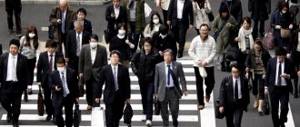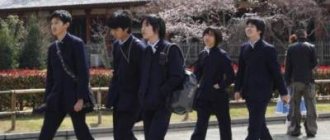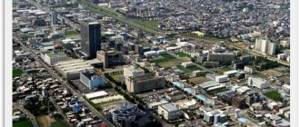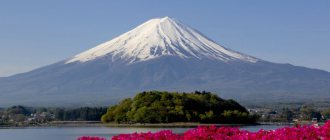- November 23, 2018
- Success stories
- Vorotyntseva Sofia
Japan is one of the most highly developed countries. It is not rich in resources; its territory occupies only two islands in the Pacific Ocean. But why does this country have a high standard of living, modern technology, and people living comfortably into their 80s? Perhaps they have special working conditions? Or do they work every day, without breaks? And why are so many of our compatriots so stubbornly eager to go to the Land of the Rising Sun?
History of the labor process
The history of the peculiarities of the labor process dates back to the 70s of the twentieth century, as people actively tried to increase their earnings. Then, in the 80s, the features were preserved, and already at that time Japan rose to second place in the world economy. The crisis and the end of the 90s entailed a restructuring of large companies and active labor activity of employees, as everyone fought for a vacant position.
Comparison of Russia and Japan
In terms of living standards and social security, Russia is far from Japan. Focusing on disease prevention and active rehabilitation after surgical interventions allows us to maintain the nation’s health at a high level. Japanese life expectancy now exceeds 82 years, and the infant mortality rate is one of the lowest in the world: 2.8 cases per thousand newborns. In Russia in 2015 this figure was 6.5.
Table: comparison of prices in Russia and Japan
| Product or service | Prices in Moscow, rub. | Prices in Tokyo, yen (rub.) |
| A loaf of bread | 25–30 | 100–110 (62–68) |
| Eggs, 12 pcs. | 62–84 | 280–350 (170–215) |
| Cheese, 1 kg | 400–550 | 1200–1500 (740–920) |
| Milk, 1 l | 39–45 | 170–190 (105–117) |
| Chicken breasts, 1 kg | 260–320 | 640–700 (390–430) |
| Fresh fish, 1 kg | 200–250 | 980–995 (600–610) |
| Apples, 1 kg | 100–120 | 300–350 (185–215) |
| Beer in a can, 0.33 l | 45–60 | 84–201 (52–124) |
| Juice in tetra pack, 1 l | 75–85 | 84–116 (52–72) |
| Pack of noodles, 0.5 kg | 35–40 | 248–258 (153–160) |
| Travel 1 trip (local carriers) | 20–25 | 182 (112) |
| Taxi around the city within 1 km | 12–20 | 68 (42) |
| Fuel gasoline AI-95 1l | 38–40 | 110 (70) |
| Rent a 1-bedroom apartment per month, residential area | 20000 | 57250 (35000) |
| Rent a 1-bedroom apartment per month, center | 35000 | 91800 (56500) |
| Payment for 80 sq.m. per month (electricity, gas, water, garbage) | 6000 | 12400 (7600) |
| 1 minute of conversation on a mobile phone (no discounts) | 1,5 | 7,63 (4,70) |
Prices in Japan are approximately 1.6 times higher than in Russia, but the average Japanese earns approximately 5 times more than the average Russian. Therefore, the purchasing power of the Japanese is much higher than that of Russians, Belarusians, Ukrainians and other citizens of the CIS.
Video: what kind of food do Russians buy in Tokyo?
https://youtube.com/watch?v=PLTBoL4Q-FE
Appearance requirements
If you are from the Russian Federation, then you will have to get used to stricter dress code requirements. Undoubtedly, everything here depends on the company itself, but in general the rules of appearance are stricter. Violation of them will entail serious consequences, which does not exclude immediate dismissal.
In ordinary companies, a mandatory element of the dress code is a black suit. You should wear it in any weather, be it hot summer or cold winter. For us this seems wild, but the Japanese begin to harden themselves very carefully in childhood. Not long ago, a decree appeared allowing people to wear short-sleeved shirts on a working day. Japan decided to take pity on the workers? No, this is how energy is saved: air conditioners are not turned on even in the hottest heat.
There are companies where female representatives are prohibited from wearing fitted and tight outfits. Straight cut only. And the skirt should cover the knees.
In addition, any jewelry is prohibited - only wedding rings.
There is a minimum of cosmetics on the face, although Japanese women themselves love bright makeup: pink blush and false eyelashes. In the labor process, a girl should become neutral, so as not to attract male attention.
There is also a rule: girls should have a short hairstyle that does not cover their ears. But hair color should always be black. If you have gorgeous blonde hair, prepare black dye.
However, not only women, but also men have their limitations. For example, they are prohibited from having a beard and mustache.
About technology
15. The Japanese don't use Microsoft Word. At all. If you can put something into a table, it will be Excel. If you need free text, break it down into slides in Power Point. Any work result will be either xls or ppt. In the archive. Encrypted.
16. Registration on any Japanese site requires:
- name in hieroglyphs;
- surname in hieroglyphs;
- name in hiragana;
- surname in hiragana;
- email;
- email again - in case you made a mistake the first time;
- mobile phone;
- landline telephone;
- postcode;
- address, only in Japanese characters;
- the name of the building you live in (all apartment buildings here have names);
- credit card number - the input field must be divided into four parts so that autofill does not work;
- security question in Japanese;
- answer it only in hiragana;
- Date of Birth;
- secret code for telephone banking (if it is a bank);
- secret code for the mobile application (4–6 digits).
Then “the application has been accepted”, and you receive the same thing by mail, but already printed. You need to put Her Majesty's seal on the piece of paper and send everything back.
And that's just to buy movie tickets online.
By the way, by the time you fill it all out correctly the 15th time, it will say: “Your session has expired, start again.” Or, Buddha forbid, hitting the back button on your browser.
The working process
Before entering your office, you will need to hand over your personal belongings to the checkpoint and take only what is useful for work. For example, a pen and necessary papers.
In addition, if in Russia we are always given instructions for the day, then in the Land of the Rising Sun there is no such thing. We can finish work earlier and go home, but here, if you work 8 hours, work 8 hours and do what you are told.
How do the Japanese work? How many hours? Indeed, the Japanese work hard. However, their principle of organizing the work process is different. For example, in the Russian Federation they pay for quality. If you don't work hard enough, you get paid accordingly. And you did everything - you have the opportunity to leave early or receive an additional task, and future career growth is ensured.
But how do they work in Japan? They pay by the hour, so almost everyone in the country takes on overtime assignments. However, they often stretch out one two-hour assignment over an entire week. The companies themselves set deadlines that do not correspond to the degree of complexity of the task. Russians regard this type of work as slowness, and the Japanese, in turn, believe that they carry out orders very carefully and attentively. And this is why it is very difficult for our compatriots to work in ordinary Japanese companies.
This phenomenon of inhibition is driving Japan into a trap. After all, in essence, work is designed not for quality, but for the amount of time spent in the office.
This is how we explained why the Japanese work a lot.
Working in Japan: a guide to action
Since there has been a wave of posts about Japan on Habré, and many commenters have questions about how to go there, how to find a job there, etc., I decided to share my rich experience with you. In addition, I will try to fill in the gaps, talk about the legal intricacies, and how you can stay here to live. Whenever possible, I will use Russian terms, sometimes English, so as not to make reading difficult. If anyone is interested in the Japanese title, ask questions, I will add it. So, let's go.
Visa
Japan has several visa categories, each with multiple residency statuses. They give (or do not give) the right to various types of activities, such as work, study, part-time work, and so on. Let's consider them all (except for transit and tourism) in order.
- Diplomatic and official visa.
They are unlikely to be of interest to us, since they are issued only to officials and are valid only for the period of a diplomatic mission. If you can get it, then there is no point in reading this post - you already know everything. - Work Visa.
This is the most interesting category. In addition to such statuses as professor, instructor, etc., it contains very important statuses - engineer, researcher and investor. It is issued for 1 or 3 years, depending on the decision of the immigration bureau. There is no way to influence this, but as a rule, the longer you stay here, the greater the chances of getting a visa for three years. All of these statuses, as well as diplomatic categories, allow you to work in Japan. All of the statuses listed below do not allow full-time work, but you can obtain permission to work part-time for up to 28 hours per week from the City office. - Temporary visa.
Issued for 15 or 90 days. You can only get it if you are invited by a Japanese person or a Japanese company. - General visa.
It includes 2 statuses for those who come to study for a long period of time (a temporary visa is usually issued for up to 3 months), as well as a status for those who come to take part in some kind of amateur cultural activity. Issued for periods from 6 months to 2 years. This also includes Dependent status, which allows you to bring your spouse to Japan. - Special visa
. It can be received by spouses/children of Japanese people or those who are here with Permanent Resident status. In addition, in this category there is also the status of long-term resident for those who suddenly decided to become a refugee. - Special statuses, without a visa
. This includes permanent resident and Japanese national. I'll tell you how to get them below.
*note. Due to changes in legislation, some visas are now issued for a period of 1 year and three months rather than 1 year, in particular to allow students to find a job after studying.
Do I need to know Japanese/English?
English is needed, but you must speak it fluently. Even despite the fact that the Japanese hardly speak it (except perhaps for bosses in companies who, due to their positions, have to communicate with foreigners). If you are going to join a foreign company, then you can’t go anywhere without it. If you're in Japanese, knowing English greatly increases your chances of getting hired. There are also chances that you will be periodically sent on business trips. Japanese is very, very desirable. Foreign companies sometimes have vacancies where knowledge of Japanese is not required. But much more often we need employees who know him. Knowledge is assessed based on the results of the state exam Japanese Language Proficiency Test (JLPT), which has 5 levels, from N5 (green beginner) to N1 (seasoned wolf). The exam is held 2 times a year, in spring and autumn for N5-N3, in summer and winter for N2-N1. The results become known after 3 months. As a rule, a good N2 is enough to work even in a Japanese company.
How to get there?
First, you need to decide what kind of person you would like to be in Japan. There are not many options - student, researcher, engineer, investor (and one secret option). Yes, of course, you can be supported by a Japanese wife, but you still need to find her. Let's also assume that you are in Russia. For residents of America/Europe, everything is somewhat simplified, from obtaining a visa to finding a job.
Student
If you have firmly decided to study in Japan, but have not yet entered a university, keep in mind that school education in Japan lasts a year longer than in Russia, so you will have to complete your studies at special courses for 1 year.
It may be a little easier to enter a university/college from a Japanese language school - the latter usually provide additional preparation, interviews with teachers, etc. University tuition costs from 600k to 1.2m yen per year. You can, of course, study not only for a bachelor's degree, but also for a master's degree. To do this, it is enough to have a diploma of higher education and pass exams (as in the case of a bachelor’s degree). I spent a year at a Japanese university as an auditing student. What can we say? The level of teachers is very good, but the educational process itself, of course, is only in Japanese. Some universities have lectures in English, but I wouldn't count on it. If you make friends with the professor, he may give exam tasks in English. The grading system is from S (91-100% correct), A (81-90% correct) to D. The latter is equivalent to a two.
Researcher
In this option, you need to ask some Japanese professor to become a researcher.
I didn’t do this myself, but I knew several people who got here this way. However, it is not necessary to currently study at a university/graduate school. You will need recommendations from the dean, head. departments, etc., in English, the more the better. You will need a ready-made work plan of at least 3000 characters. You will need to find a grant for your project (look on the websites of Japanese universities), as well as a professor who is conducting research on a similar topic (again, they are all on the websites). Next, you will need to write a letter (in English) to the selected professor, say that there is such a grant, attach recommendations and a work plan, and wait for a response. If you can’t find a grant, you can also try the Monbugakusho scholarship, but keep in mind that only a few receive it. Having a diploma with honors is mandatory. Publications are desirable.
Engineer
This is how I got here too.
Let's not consider the obvious option - receiving an invitation from a Japanese company. It is very, very difficult to find a company that agrees to take you out of Russia, unless you are an exceptional super-specialist, and that is exactly what Japan is missing. What to do if there is no such company? The answer is simple - look for it. And search while in Japan. And to do this you need to get there on some other visa. Or Temporary, if you have a Japanese friend who can invite you. Or get a visa with Precollege student status. It is provided by a lot of language schools. You can use the services of a special office that will handle the paperwork. For example gaku.ru. But you can also contact the school directly. Detailed requirements and application process are outlined on the gaku website. I will just say that studying in Japan, at a language school, is often cheaper than courses of the same duration in Moscow, and amounts to about 240 thousand rubles per year. For a year of living (food, housing, transportation) an additional 500 thousand rubles will be required. During this time, you can improve your Japanese from zero to N3 (N2 if you try really hard). Two years before N1, but in this case the costs, of course, double. Upon completion, you will be able to calmly look for a job, especially since the process is not quick and takes from 3 to 6 months.
Yes, if you are a citizen of Australia, Canada, France, Germany, Korea, New Zealand, Taiwan, Hong Kong or England, you are lucky. Your country has special agreements with Japan, and you can receive the so-called. Working Holiday Visa, valid from 6 months to 1 year, and do whatever you want in Japan. Very comfortably.
Investor
This is an option for the rich.
But in reality, not much is required. Even if you are in Japan on a tourist visa, you have the right to open your own company. It is best to contact English-speaking lawyers who will help you collect all the necessary documents. In order to obtain a visa with business / investor status, your company must either employ two full-time Japanese people, or have an authorized capital of at least 5 million yen. That is about 40 thousand dollars. In addition, if you graduated from a Japanese university and suddenly decided to open your own company, you can, upon request, be given an additional 6 months for the entire procedure, with monthly verification and reporting.
How to look for a job?
Let's assume you chose option 3.
We received some kind of visa, arrived, and began to act. The best places to start your search are CareerCross and DaiJob if you work in enterprise systems and your languages are C++, Java or C#. Experience with databases, typically Oracle, Sybase or DB2, is highly desirable. Experience developing for Linux/Solaris too. If your path is web development, you can also look at the work on Green Japan. Most likely you will communicate not directly, but through recruiters. Therefore, you can see the work on their websites. The best companies I know are Skillhouse and Morgan McKinley. But you can also pay attention to TradeWinds Consulting, Aptus Consulting, as well as directly to companies such as Microsoft and Google.
Now about the difference between Japanese and foreign companies. It's quite big.
- Foreign companies have vacations, while Japanese companies just give you a few days off per year, usually about 12, and then the number grows. You can’t take on a lot in a row, so you won’t be able to arrange a vacation. The Japanese often add them from different sides to Golden Week and New Year's weekend, due to which they lengthen very well.
- Japanese companies do not have sick leave. If you are sick, you will spend days from your vacation days. If your time off is over, you, of course, may not come, having notified your boss in advance, but this day will be deducted from both your salary and your bonus.
- Japanese companies often compensate for housing costs (from 20 to 100%), travel costs, and give 2 bonuses per year equal to 2-3 salaries. But on the other hand, in Japanese companies the wages are much lower than in foreign ones.
- In Japanese companies, it is customary to recycle (this is the word you should probably remember - 残業 - zangyo, recycling). Depending on the company, it may be of different lengths, it may be paid, or it may not. Where I worked, we worked an average of 2 hours a day. At the same time, processing on Saturday (if there was an emergency, for example, and the version was closed) was paid 10% more, and on Sunday generally at a double rate. So the Japanese don’t just sit until midnight either.
A few more facts about Japanese companies. The attitude towards foreigners there is normal, especially after you go to corporate drinking parties a couple of times. This is such a feature of the Japanese mentality - the division of people into friends and foes, at all levels, from country to company and family. So, if you happen to work with a Japanese, you become one of them. The Japanese really like to work according to instructions. But this does not mean that there are no creative people. There are simply few of them. In the software development industry, fortunately, there are many more such people, but unfortunately, not among managers. Although there are some good ones. And the Japanese also love to organize meetings for any reason. For example, how to answer calls correctly. Or how to ride a bike more carefully.
The lifetime employment system in Japan, legally, has long been gone (it disappeared about 30 years ago). In practice, salary depends on length of service, and there is no point in changing jobs frequently. Especially if you have a family, and even a house with a mortgage. That's why the Japanese sit in one place - if you quit, you'll have to start all over again, regardless of your knowledge. It’s easier for foreigners in this regard - we know English and can always transfer to a foreign company. But if you have already decided on Japanese, choose more carefully.
Accommodation
In short, your choices are limited by your cash.
If you are a student at a language school, it will provide you with a dormitory. Sometimes a company can provide hostel accommodation if you don't mind living in close quarters. Payment is usually 2-3 mana yen (mana is 10,000 of anything, 1 mana yen is about 3,000 rubles), including utilities and the Internet. You can get slightly better conditions by staying in a guesthouse. It's almost an apartment, in the sense that you will be alone in the room. But the toilet, kitchen and bathroom are still shared. This is a very convenient option if you want to rent an apartment, but cannot do it immediately (for example, upon arrival, since it takes about 3 weeks to issue a foreigner registration card). A guesthouse costs about 5-6 mana, utilities and internet are included in the price. You can pay in advance by credit card online. Finally, you can rent an apartment. This is a somewhat tedious and very expensive process. The Japanese even have an expression, 引越し貧乏, hikkoschi binbo: or poor man after moving. Depending on the area of residence and the area, an apartment can cost from 3 to 50 mana per month. For 3 you will shoot something 16-18 square meters in size (I have exactly that). However, you will have to pay much more upon arrival. What are the expenses? Here is the list:
- 礼金, reikin, or, based on the hieroglyphs, money in gratitude. This is a gift to the owner of the house for agreeing to shelter you. This money is not returned, and few people take it anymore (5 years ago the situation was worse). They were introduced, as far as I know, after the great earthquake in Kobe, when there was simply nowhere to live. When there is reikin, it is 1 to 3 monthly amounts.
- 敷金, sh(i)kikin, or pledge. Also ranges from 1 to 3 monthly amounts. Returns at the end of the contract.
- 保証金, khoshcho: kin, or insurance money. The fact is that a foreigner cannot just rent an apartment. A Japanese person or a Japanese company must vouch for it. And if you are not working yet, then you have to turn to the services of a third-party company. One monthly amount.
- Payment to realtors. Another monthly amount.
- Apartment insurance, not to be confused with insurance money. You don’t have to pay it, usually around the 1st monthly amount.
- Sanitation. Cleaning the apartment from the previous owner. You will have to do it, it takes about 2-3 mana.
Well, of course, the first month’s payment, plus, if you live not in a one-story house, but in a manschen, that is, a multi-unit house, a monthly payment for maintenance (house cleaning, elevator, etc.) Despite the fact that I pay for apartment 3 mana per month plus 5 thousand for service, upon entry I paid about 18 mana. The contract is usually drawn up for 2 years. You can’t house anyone with you, but if, for example, your parents come to visit you, no one will be indignant. It is also forbidden to have pets (with the exception of fish and hamsters).
As a conclusion
Among foreigners living here, there is often an opinion that the fewer foreigners there are in Japan, the better the country. This point of view has a right to exist, because only a few gaijins here really try to understand Japanese culture and work. The rest, mostly Americans, are simply parasites on Japanese society. So with this post I did what some people asked me not to do. Now the guide to action is yours. Joy 
Division of labor and stratification of society
In order to grow a seed, you need a lot of work and clear organization of your actions. For this reason, a concept with a very strict stratification of people was formed in Japan. Each person has his own direct responsibilities and his own role in the production process.
Communities in Japan have always been well organized. For example, a samurai never prepared food for himself and could easily die of hunger if the peasants did not feed him.
Because of this mentality, it is very difficult for every Japanese to make independent and independent decisions that are not characteristic of his social status. They cannot take on any responsibility that is in any way outside the scope of their “normal” life. To put or not to put a comma is a difficult decision for a Japanese that takes half a day. Preparing ordinary papers is a process of endlessly long, slow consultations and negotiations. It is worth noting that if an employee has the courage to make a decision that does not correspond to his status, then everyone without exception in the hierarchical chain will receive a reprimand. The principle of the system is this: “I am a simple person and I am obliged to do only what I am supposed to do.”
However, such a rigid system is understandable: Japan is a small country with a large overpopulation. To best support people, strict boundaries and rules are needed. It is necessary to clearly understand: here is my territory, and there is the territory of another. And respecting the boundaries of another is simply necessary.
The Russian Federation has a huge territory, so we are not so constrained in our actions.
About the service
19. The Japanese client-oriented approach towards visitors is characterized by the following trick, which all newly arrived gaijin fall for. To open a bank account you need a phone, and to buy a SIM card you need a bank account.
20. In general, the level of service in Japan is bomb. The first reason why you never want to leave here. It is quite difficult to achieve this level. The instructions for new employees in the cafe are as thick as “War and Peace”; you must memorize everything by heart: without this, you will not be allowed to work.
Everything is there: how to hand over a check after payment with both hands and with a bow, the degree of this bow, how to count out change with coins and bills, how to accept cards, what to do if the toilet bursts or a customer complains about the food, how to greet visitors entering the store, and etc.
Why are the Japanese less reserved?
In Japan, it is not particularly appreciated when a person shows off his achievements or advantages. The Japanese can perfectly pick up any idea and improve it several times so that the whole world will admire it. And they really succeed! But creating something of your own is very problematic. Creativity is not the most important trait of the Japanese. The ability to improve is especially valued here.
In Russia, without a creative approach, you can simply get lost in the crowd, so a creative mindset is very important for us.
About business correspondence
1. First and most annoying: a lot of water in emails and text messages. Type:
- Hello!
- How are you?
- Can you talk?
Or 150 lines of cliche text in the header of the letter, somewhere in the middle - one line in essence, then 150 lines of cliche conclusion and signature with all the regalia.
2. The Japanese send applications in an encrypted archive. And the password is sent by another letter to the same address. For what? Who taught them this? You then respond to such a letter, attach a text file or picture, and in response: “Our antivirus does not allow opening attachments.” The password will usually be "12345" or something similar. For the convenience of the recipient, of course!
3. If a Japanese needs to receive data in a structured form, he sends you Her Majesty an Excel table with a form to fill out. Everything would be fine, but it will definitely have a VBA macro to validate all input fields. What would it be like without them? Mac users are especially happy. According to the rules for validating the form, your last name will definitely not fit, because you are a “gaijin” (foreigner) and have come here in large numbers. But the macro won’t tell you about this, it will simply give you the error “Invalid input” in one of the thousands of fields that you filled out.
A classic of the genre: a screenshot pasted into Excel, compressed into an archive with a password, the password in another email. The needle is in the egg, the egg is in the duck.
4. Any letter is written by the most terrible clerk. The art of its knowledge is unknown even to the Japanese themselves. And they sincerely believe that it is purely genetically impossible for a foreigner to comprehend “sonkeigo” (the style of polite speech).
5. The Japanese have a wild love for mass mailings marked “very important” or “response required” when in fact it is not important or required. Then they will send it another five times for reliability. Particularly sophisticated Japanese know how to “automate” the process with the labor of low-paid hourly employees.
You will have to get used to group emails of 30 people per copy. How you ended up there, and why this topic is relevant to you, even the person who added you there doesn’t know. In Japan there is no Reply button, only Reply all.
Career ladder
In an ordinary Japanese company, a career is created over a long period of time. Here, promotion depends not on your merits and awards, but on your age. A young and talented specialist will always work in low positions with low salaries. Because of this organization of the labor process, Japan becomes less competitive in the world market. This type of business, although it preserves “Japanese quality,” greatly slows down progress.
Wage
We figured out how the Japanese work, and it’s time to raise the topic that interests people the most—salary. Compared to the world, wages in Japan are quite high. However, its size is reduced by 30 percent due to the current tax system. Young staff receive low wages. But the older the person, the higher his salary. And pensions in Japan are very decent.
How are salaries calculated in Japan? Each employee has a certain . These are special forms on which the time of your arrival at work and the time of leaving it are manually noted. There are also special cards. When you swipe this card on the required device, your arrival and departure are automatically entered into the electronic database.
At the end of the month, your salary will be calculated using these cards. This will also include both basic wages and overtime.
About training
17. If you look at university education, then physics, chemistry, all sorts of strength materials and other applied engineering are at their best here. This can be seen in cars, roads, bridges, consumer electronics, and building materials. But there’s a problem with computer science.
Japanese programmers touch industrial code for the first time during on-the-job training (aka on the job training, OJT). At the university, my classmates in the master's program (!) could not give out more hello world. Why they should study at university at all is a mystery.
18. OJT is a way to pay starvation wages to new employees after university for the first three years. At my last job, they even had a sticker on their badges: “First Year OJT,” “Second,” “Third.” Like “spirit”, “scoop”, “demobilization”.
Weekend
In the Land of the Rising Sun, people work without vacations. The only days for rest are Saturday and Sunday. Various companies provide the opportunity to take additional days off. For example, a company gives 8 days off. They need to be divided into parts, that is, you won’t be able to take 8 days off at once. You must give 1 month notice of your intention to take a mini-vacation. This is due to the fact that employees must have time to cooperate so that your absence does not cause any damage to the company. In some companies, you need to warn about a day off even earlier. Therefore, if you have an unforeseen situation, you will not be able to leave work.
Another feature of working in Japan: if your temperature rises in the morning, no one will consider this a good reason for missing work. In Japan, people go to work even if the thermometer shows “38”.
The days off are official holidays and Obon (the day when the dead are remembered). However, a young specialist does not have the opportunity to get an extra day off in the first two years.
The main holiday, New Year, takes 1-3 days. But if these additional days off fall on Saturday and Sunday, then no one will reschedule them.
In addition, there is also a “golden week”, which consists entirely of holidays. Whether to arrange a day off or not is up to the company. How long do Japanese people work per week? All 5 working days.
What threatens illegal immigrants?
Despite its seemingly loyal attitude towards migrant workers, Japan strictly ensures that all foreigners work in the country legally. To control illegal immigrants, inspection measures at the border are being tightened, and special committees are being organized to monitor the condition of workers at local enterprises. However, every year thousands of immigrants seek illegal work in Japan at their own risk.
The Japanese government is cracking down on illegal workers.
It should be said right away that illegal employment, from the point of view of legislation, is equivalent to a criminal offense. You could receive a fine of around 300,000 yen or even an actual sentence of up to five years in prison. The court may also deport illegal immigrants and ban them from entering the country for one to five years.
Video: Japanese interviews or how to find a job in Japan
Working day
How long do Japanese people work? Residents of Japan work for about 10 hours. Therefore, the statement that the Japanese work 18 hours is a myth. The working day starts at 9 am and ends at 7 pm. However, there is a rule: you cannot arrive exactly at the appointed time. You are required to be at your workplace half an hour beforehand, as Japanese companies believe that the remaining 30 minutes are necessary for mental and physical preparation for work.
You already know how many hours a day the Japanese work. Another interesting feature: you cannot go home until your boss leaves his place. As long as he works, everyone else should work too. And it doesn’t matter how long you are delayed - 15 minutes or 2 hours: no one will pay for this time. Thus, we have dispelled the myths about how much the Japanese work.
Initiative is punishable
Japanese employers suppress any manifestation of individuality, considering it a violation of harmony in the team. Independence and initiative are condemned here, not welcomed. If your colleagues ask for your opinion, then know that they simply want to voice to you a collective decision that has already been made.
The most important thing is to pretend that you are working, not to show off to management and colleagues. One European, who was an employee of a Japanese company, cited the example of a sales colleague who did not make a single transaction for a year, but in the end received bonuses and a salary increase only because no one saw or heard of him. So imitation of vigorous activity is the key to promotion. And no one is interested in your real achievements.
Communication with colleagues
In Japan there is a special tradition called “nomikai”. Translated: “to drink together.” Most often, this concept refers to companies and firms where employees must drink with their colleagues every day (or less often). For us, this seems wild, since in Russia there is a rather negative attitude towards alcohol, but in Japan such drinks are welcome. Even doctors recommend using them, but they are silent about the quantity and frequency of use.
Residents of the country don’t know how to drink, so they get drunk very quickly. Alcohol will not cost you anything, since it is paid for by the boss or the company itself.
Some companies have even introduced payment for “nomikai”. If you work together, then you drink together - this is the Japanese tradition. In the end, it turns out that a Japanese person spends almost his entire life in the office, surrounded by his colleagues.
Business immigration
Starting your own business is truly a reason to move to Japan. To do this, first of all, you need to open a “business investment, business management” visa, which will initially be valid for four months, after which it can be extended for up to a year. However, the validity period of the first visa should be quite sufficient to analyze the economic environment and register a business. By the way, you can not only open your own, fundamentally new enterprise, but also open a branch of a Japanese company or an office of a subsidiary company.
Business in Japan can only be built on a well-founded plan. The investment amount must reach five million yen. If we are talking about opening a business together with a Japanese citizen, in this case the joint authorized capital must be at least ten million yen. Citizens of the country or at least holders of permanent residence in Japan can be hired full-time in an open enterprise.











